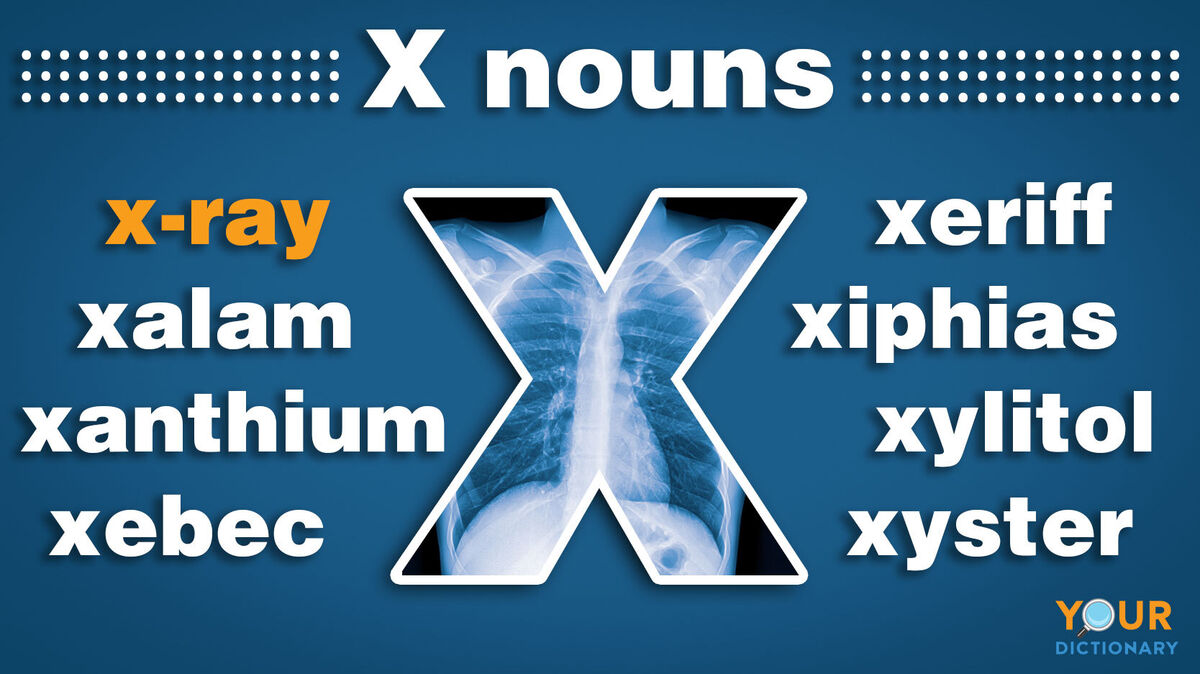
Nouns are one of the most important parts of speech. They pop up as the subjects of our sentences and the objects of our verbs. They describe the people, places, or things in our lives. The letter X may not be as popular as the consonant S or the vowel A, but we can name at least 50 nouns that start with X. Ready to learn to play the xalam and identify the xanthophane in your favorite fall leaves?
50 Nouns Starting With X
Who knew the world was full of so many X-nouns? In truth, many of these nouns are no longer in usage, such as xenodochium and xerophagy, but you might recognize a few. The next time you go to an art fair, you’ll appreciate the xylographer, or the person who made beautiful engravings on wood:
Noun | Definition | Synonyms |
a horizontal axis | ||
a noteworthy talent or quality | it factor, wow factor, special talent | |
X Games | an extreme sports competition presented by ESPN | competition, extreme sports, tournament |
a picture taken of the inside of something | radioactivity, encephalogram, fluoroscope | |
x-wing | a fictional spacecraft from Star Wars | fighter jet, spaceship, jet plane |
a traditional lute-like string instrument of West Africa | instrument, lute, banjo | |
minute unicellular algae | green algae, scum, residue | |
a nitrogenous substance related to uric acid | powder, urea, chemical compound | |
common weeds found in North America | weed, plant, sunflower | |
a skin disease marked by yellowish patches on the skin | lipodosis, hyperlipidemias, skin disease | |
yellow pigment in the inner segments of the retina | pigment, color, chromophane | |
yellow coloring in yellow autumn leaves | pigments, carotenoid, carotenes | |
a yellow acid formed by hot nitric acid on protein matter | ||
a yellow crystal alkaloid found in the root of the yellow puccoon | ||
a shrub from North America with deep yellow roots | yellowroot, plant, shrub | |
xanthorrhoea | a plant from Australia with a thick stem and long, grasslike leaves | flower, plant, perennial |
the yellow discoloration often seen in cancerous tumors | ||
prickly shrubs or small trees with deep yellow bark and roots | rue, prickly ash, Hercules club | |
a small, three-masted ship once common in the Mediterranean | vessel, sailboat, zebec | |
xenium | a present given to a guest, stranger, or foreign ambassador | gift, offering, bequest |
in the Middle Ages, a room in a monastery for receiving and entertaining guests | parlor, den, housing | |
the reception of strangers | reception, hospitality, welcome party | |
the production of offspring that's unlike either parent | ||
a passion for foreign customs, institutions, and manners | ||
a heavy, colorless, gaseous chemical element with atomic number 54 | noble gas, chemical element | |
an irrational fear of foreigners or anything foreign | prejudice, bigotry, racism | |
an armadillo | ||
an old money from India, equal to three fifths of a rupee | cash, currency, money | |
a gold coin formerly used in Egypt and Turkey | money, coin, doubloon | |
a skin disease marked by small spots resembling freckles | ||
among early Christians, a diet of dry food during Lent and other times of fast | fasting, diet, meal | |
an extreme dryness of the eyeball caused by vitamin A deficiency | ||
a swordfish | broadbill, fish, billfish | |
an extinct camel-like mammal | ungulate, artiodactyl | |
short for Christmas | Christmas, yuletide, holiday season | |
wood coal, or charcoal; distinct from mineral coal. | coal, lignite, cinder | |
a type of transport tissue in plants that carries water | ||
colorless, inflammable hydrocarbon found in coal and wood tar | ||
a green or blue pigment produced by a fungus in some decayed wood. | ||
a crystalline alcohol derived from sugar | alcohol, xylose, sweetener | |
a yellow oil with a geranium-like smell, a side product in making phorone | ||
an engraving on wood | engraving, carving, printing | |
one who practices xylography | printer, engraver, artisan | |
the art of engraving on wood | woodcutting, wood engraving | |
a beetle whose larvae live in wood | insect, bug, | |
musical instrument made of wooden bars | carillon, marimba, vibraphone | |
the art of burning pictures on wood with a hot iron | ||
an herb with grassy leaves and small yellow flowers | Yellow-eyed grass, flowering plant | |
a surgical instrument for scraping bones | surgical rasp, surgical file, tool | |
a long, open portico for athletic exercise | gymnasium, porch, colonnade |
What Is a Noun?
A noun is a person, place, thing, or idea. When we use them in our writing, we often need to place an article before them, such as “a,” “an,” or “the.” For example, “a tractor,” “an arboretum,” or “the trellis.”
One of the primary functions of nouns is to act as the subject of the sentence. So, in the sentence, “Her xylophone is black,” “xylophone” is a noun. Nouns are often direct objects, too. In the sentence, “She plays the xylophone,” “xylophone” acts as the direct object. It’s the object of the verb, “plays.”

Types of Nouns
Nouns are organized into several different categories. Here are five of the most varieties:
- Proper nouns name specific things, like the names of people, cities, states, countries, buildings, and books. As proper nouns, they are capitalized. So, “Xander” is a proper noun, but “man” is a common noun.
- Common nouns refer to general items, such as “city,” instead of “Xi’an,” (a city in China).
- Abstract nouns are used when you can’t touch the noun. These nouns are theoretical, such as “love” or “time.”
- Collective nouns refer to large groups, such as a “troop” of baboons or a “herd” of sheep.
- Possessive nouns demonstrate ownership over something else. For example, with “Xavier’s X-ray,” “Xavier’s” is a possessive noun, indicating that it’s his X-ray.
To continue to explore these categories, check out Types of Nouns.
10 Example Sentences
X-nouns may not be common, but there may come a day when they pop up in your reading or writing. Here are ten examples:
- Draw a line across the x-axis.
- After the accident, they took an X-ray of my wrist.
- He pulled out an old leather sack and exchanged the xeriff for a brass ring.
- The “X” in X-mas is short for Christ.
- He perilously entered into the xenodochium, for fear of reprisal from the monks.
- Although she’s an American, her xenomania for all things German is potent.
- You should go to the dermatologist to have that xeroderma looked at.
- Did you know xylene is a hydrocarbon?
- How can there be a xiphodon in the desert? Aren’t they extinct?
- Xenon and helium are both gases.
Get Excited About X-Words
Wish you knew if there were X-words in other parts of speech beyond nouns? If so, you'll love further exploring English words that start with X using WordFinder's word list tool. There, you'll discover a full list of words that start with the letter X organized by word length. You can even adjust the list to focus solely on words of a certain length or that contain or end with specific letters or that have a certain combination of letters at the beginning. Who knew it could be so fun and easy to discover words that begin with X!
X-Nouns Abound
Who knew so many X-nouns existed? If you’re working on a new short story or poem, you can consider adding in some interesting elements thanks to the letter X. Why not have one of your characters visit an ancient monastery with a xenodochium where he exchanges xeraphim for a copy of the Quran? Your tales can go anywhere with a robust understanding of the history of the English language. For more on that, check out these Roots of English Words Found in Greek Mythology. See where your next adventure takes you!